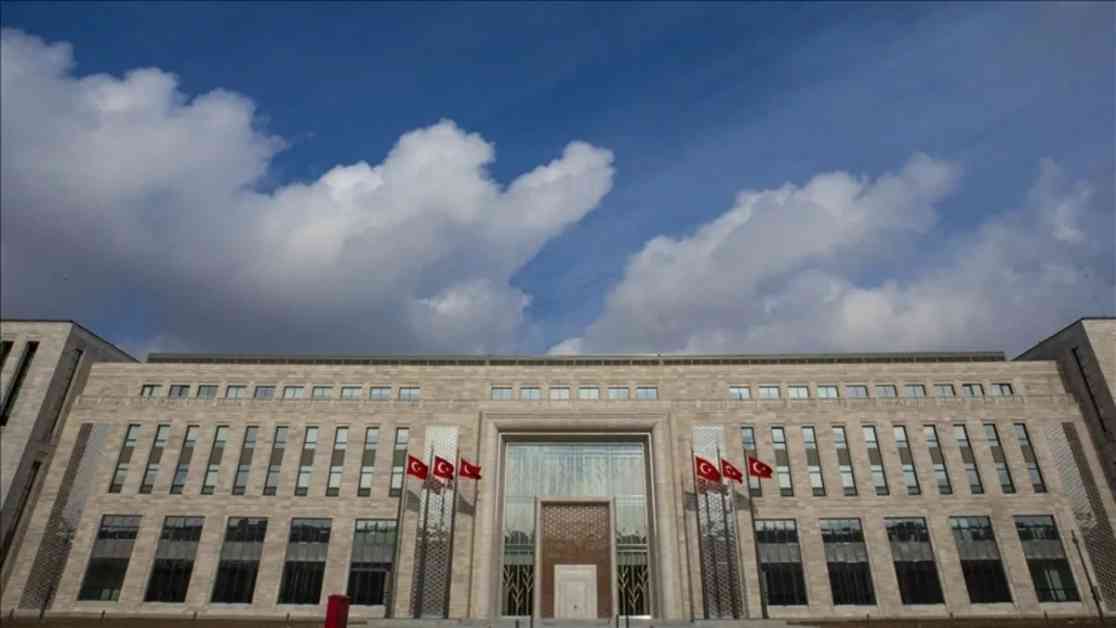Analysis of the ‘2024 US Elections and Possible Impacts on Turkey’
The National Intelligence Academy recently published an analysis evaluating the new era following Donald J. Trump’s victory in the US presidential elections. The analysis highlights that the Trump administration’s emphasis on leader-centric decision-making processes and a pragmatic strategy could lead to a more calculated and negotiation-based approach in international relations.
According to the analysis released by the National Intelligence Academy, in this new era, many countries, including Turkey, may undergo a process of reassessing and restructuring their relations with the United States. It is suggested that particularly for Turkey, a collaboration ground based on interests aligning with the US’s regional policies could emerge.
Critical Threshold for Global Leadership Role and Future World Order
The Academy stated that the 2024 Presidential elections will determine whether the United States will preserve, redefine, or share its role as a global leader with other major powers. The election is considered a critical juncture in shaping the future world order.
Republican Party’s Foreign Policy Move
The analysis published highlights the Republican Party’s foreign policy strategy focusing on deterrence, hybrid intervention methods, technological superiority, and economic power. Trump’s adopted slogan “Make America Great Again” (MAGA) is seen as an extension of the traditional Republican orientation.
Strategic Tools of the Trump Administration in Foreign Policy: Power, Deterrence, and Crisis Management
While the Trump administration aims to limit traditional Republican stances on global military and diplomatic engagement, meaning to reduce the US military engagement in ongoing crises, it is also emphasized that the US must maintain and strengthen its global punitive power. The analysis states, “Washington’s primary goal is to have a strong deterrent that renders the maximum benefit hoped for by competitors’ control meaningless, preventing competitors from benefiting from the situation.”
Risks and Opportunities in Turkey-US Relations in the New Era
The analysis underlines that Trump’s second presidential term poses both opportunities and challenges. Overcoming restrictions on defense industry and the F-35 program emerges as a critical topic for creating a positive agenda in Turkey-US relations. The potential reevaluation of overseas military presence and support to the PYD/YPG by the Trump administration could provide an important platform for Turkey to cooperate with the US in counterterrorism efforts. However, progress on such issues will be closely linked to the composition of Trump’s administration team and the priorities in US regional policies.
On a regional level, the analysis suggests that the hardening of Trump’s Iran policy and support for normalization processes between Israel and Arab countries could both positively and negatively impact Turkey’s regional interests. The risk of regional conflict triggered by harsh policies towards Iran directly concerns Turkey’s security policies. Similarly, the increased influence of Israel, receiving unconditional support from the Trump administration, could shift power balances in the Eastern Mediterranean against Turkey. These developments may necessitate Turkey to deepen its regional cooperation and balancing policies.
Deepening dialogue processes with Egypt and Greece and continuing initiatives that prioritize regional stability are highlighted to contribute to Turkey’s efforts to protect its interests in the Eastern Mediterranean.
Efforts to end the Ukraine war by the Trump administration could create significant opportunities for Turkey. Ensuring stability in the Black Sea could enhance Turkey’s efforts in regional mediation and damage control. Additionally, the active involvement of Turkish companies in the reconstruction of Ukraine could create a collaborative area strengthening Turkey-US economic relations. The strategy that Trump will pursue in seeking a peace agreement between Ukraine and Russia will be closely monitored for its impact on Turkey’s interests in the Black Sea and Eastern Mediterranean.
Conclusion
The victory of Trump in the 2024 US Presidential elections marks a significant turning point both for US domestic politics and the international system. Trump’s “America First” approach indicates a leader-centric and pragmatic strategy in foreign policy. This strategy could evolve within the framework of new global and regional dynamics compared to past periods. Trump administration’s focus on a strong military and economic superiority strategy in foreign policy includes key priorities such as relations with NATO allies, ending the Ukraine war, efforts to achieve economic and technological superiority over China, and containing Iran in the Middle East.
Trump administration’s “America First” approach stands out as an effort to redefine the US’s leadership role in international relations by focusing on its interests. However, this approach has the potential to create an unpredictable policy process for both allies and rivals due to the different leadership style from the established order. Leader-centric decision-making mechanisms and prioritization of pragmatic diplomacy could overshadow institutional functioning. This situation is seen as the beginning of a period filled with uncertainties for other actors in the international system. Demands for increased defense spending from NATO allies and pushing EU countries to enhance collective deterrent capacity could lead to new tensions in transatlantic relations. However, Trump administration’s efforts to encourage allies to be more effective in economic and military burden-sharing could potentially create a new balance in responsibility sharing within the alliance.
For Turkey-US relations, Trump’s second presidential term harbors both opportunities and challenges. Overcoming restrictions in the defense industry and the F-35 program emerges as a critical topic for creating a positive agenda in Turkey-US relations. The potential reevaluation of overseas military presence and support to the PYD/YPG by the Trump administration could provide an important platform for Turkey to cooperate with the US in counterterrorism efforts. However, progress on such issues will be closely linked to the composition of Trump’s administration team and the priorities in US regional policies.
On a regional level, the hardening of Trump’s Iran policy and support for normalization processes between Israel and Arab countries could both positively and negatively impact Turkey’s regional interests. The risk of regional conflict triggered by harsh policies towards Iran directly concerns Turkey’s security policies. Similarly, the increased influence of Israel, receiving unconditional support from the Trump administration, could shift power balances in the Eastern Mediterranean against Turkey. These developments may necessitate Turkey to deepen its regional cooperation and balancing policies. Deepening dialogue processes with Egypt and Greece and continuing initiatives that prioritize regional stability are highlighted to contribute to Turkey’s efforts to protect its interests in the Eastern Mediterranean.
Trump administration’s efforts to end the Ukraine war could create significant opportunities for Turkey. Ensuring stability in the Black Sea could enhance Turkey’s efforts in regional mediation and damage control. Additionally, the active involvement of Turkish companies in the reconstruction of Ukraine could create a collaborative area strengthening Turkey-US economic relations. The impact of Trump’s strategy in seeking a peace agreement between Ukraine and Russia on Turkey’s interests in the Black Sea and Eastern Mediterranean will be closely monitored.
In conclusion, Trump administration’s leader-centric and pragmatic approach will bring both opportunities and risks in Turkey-US relations. Turkey has the potential to address problematic issues such as restrictions on the defense industry and support for the PYD by emphasizing its interests aligned with US regional policies. Effective use of diplomatic communication channels and strengthening strategic cooperation areas could lead to a positive evolution in relations. However, considering the unpredictability of the Trump administration and deficiencies in institutional functioning, Turkey must pursue a dynamic and multidimensional diplomacy critically.
By carefully navigating the opportunities and challenges presented in the new era following the 2024 US elections, Turkey can strengthen its ties with the United States and advance its regional interests effectively.











